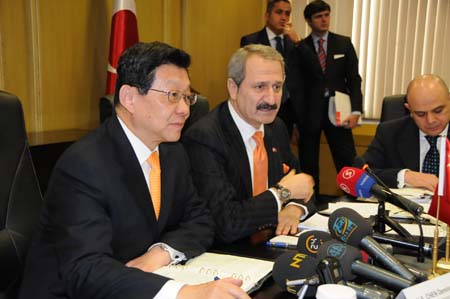China, Turkey to boost closer economic ties
China and Turkey look to trade growth and a larger scale of mutual investment in a bid to forge closer economic ties, the two countries' top trade officials said?in Ankara?Thursday.
 |
|
Chinese Commerce Minister Chen Deming (1st L) and Turkish State Minister for Foreign Trade Zafer Caglayan (2nd L) attend a joint news conference after their meeting in Ankara, capital of Turkey, on Jan. 7, 2010. [Zheng Jinfa/Xinhua] |
"For China, Turkey is an extremely significant strategic trade partner with its location between Europe and Asia," China's Commerce Minister Chen Deming said after a meeting with Turkish State Minister for Foreign Trade Zafer Caglayan, noting that Sino-Turkish trade has a good prospect despite the impact of the global financial crisis.
China will work with Turkey to improve transportation between the two countries to facilitate economic ties and wants to see the revitalization of the ancient Silk Road, a 2000-year-old ancient trade route linking Asia and Europe, Chen told reporters.
The minister said China will take measures to encourage Turkish companies to expand sales network in China, adding that he had discussed with Caglayan on boosting cooperation in such sectors as finance, food, energy, tourism and processing industry.
Both sides should continue to solve trade disputes properly through friendly negotiations and fight against trade protectionism, he said.
More than 100 Chinese entrepreneurs came along with Chen to seek purchase and investment opportunities during the minister's four-day visit to Turkey.
China and Turkey saw their trade surge from more than US$1 billion in 2000 to US$12.6 billion?in 2008. Turkey's exports stood at only US$1.98 billion?in 2008.
Caglayan said Turkey's total export volume decreased in 2009 because of the global recession but its exports to China rose significantly, while China's exports to Turkey dipped last year.
He rebutted the generalization of Chinese products as "low-quality", saying substandard products happen to every country.
"I have been to China, talked with Chinese entrepreneurs and visited their factories," he told reporters. "I know the good quality of their manufacturing."
Caglayan said his country hopes a railway be built and more air routes to link China and Turkey.
The two sides will set up a team to promote mutual investment, especially in such areas as contract construction, auto, mining, mechanical and chemical industries, he said.
Turkey welcomes Chinese companies' participation in building nuclear power plants in Turkey, he noted.
Caglayan said he and Chen had also discussed China's interest in the planned construction of a third bridge over the Bosporus Strait in Turkey's largest city Istanbul and a high-speed rail line between the Turkish capital Ankara and western city Izmir.
Chinese enterprises' direct investment in Turkey reached US$313 million as of the end of September 2009, with the amount in the first three quarters accounting for more than 90 percent of the total, figures from China's Commerce Ministry show. Meanwhile, actual investment by Turkish companies in China exceeded US$100 million as of the end of October.
Chen arrived in Ankara on Wednesday night and will be in Istanbul on Friday before concluding his visit on Saturday.
Go to ForumComments
Add your comments...
- User Name Required
- Your Comment
- Racist, abusive and off-topic comments may be removed by the moderator.
 0 Comments
0 Comments






